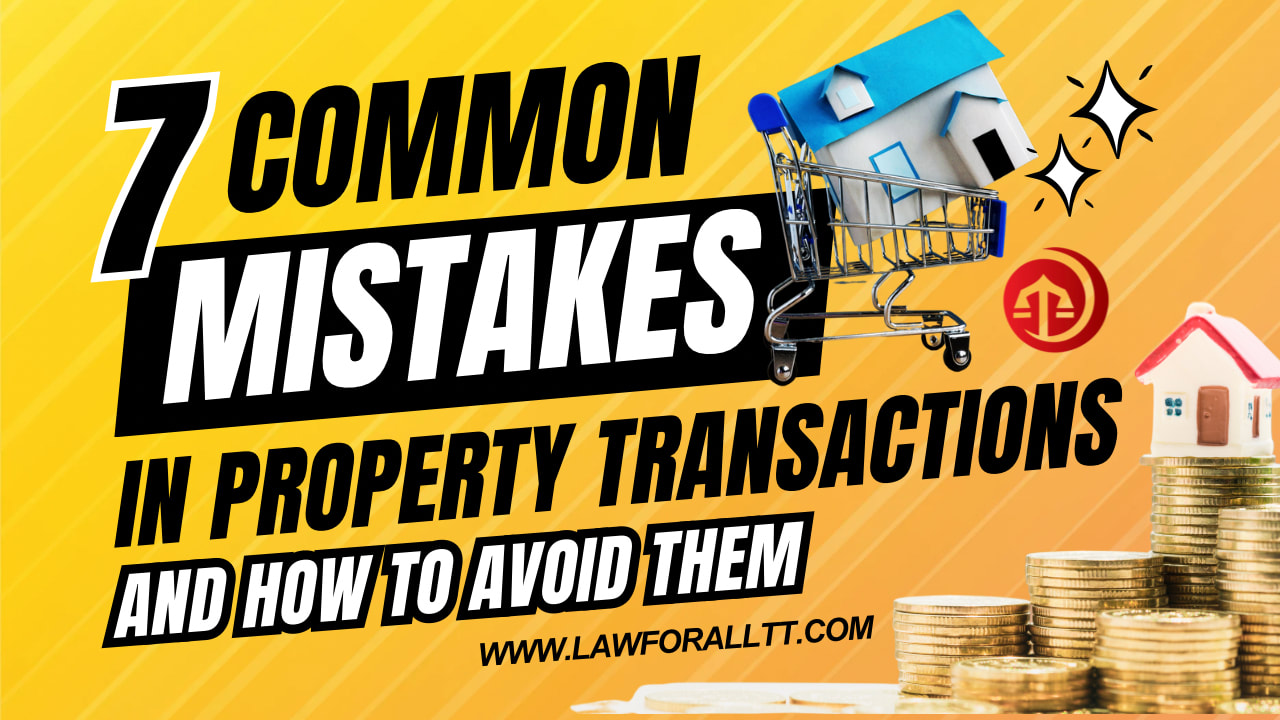|
Divorce can be a complex and emotionally charged process that requires careful consideration and adherence to legal frameworks, especially in the context of Trinidad and Tobago. In this article, we will explore ten crucial aspects to contemplate when navigating the divorce process in the jurisdiction, addressing key issues such as the separation of assets, arrangements for children, and personal maintenance obligations.
0 Comments
Property transactions, while offering significant investment opportunities, can be fraught with potential legal issues and financial risks, especially in a market like Trinidad and Tobago where regulatory and procedural specifics can complicate matters. Understanding common pitfalls and knowing how to navigate them can save potential property owners from costly mistakes and legal troubles. Here, we outline some of the most common mistakes made in property transactions and provide guidance on how to avoid them. There is a common misconception that estate planning is only necessary for the elderly or those with substantial wealth. However, in Trinidad and Tobago, as in many other jurisdictions, estate planning is crucial for everyone, regardless of age or economic status. This article explores why all adults—both young and old—should consider setting up an estate plan. The Property Tax (Amendment) Act, 2024, introduced to Parliament, on March 15, 2024, and assented to on March 27, 2024, heralds a shift in the property tax landscape of Trinidad and Tobago. By amending the Property Tax Act Chapter 76:04, this Act addresses concerns of property owners over the fairness and accuracy of property tax assessments, marking a step toward a more equitable and transparent property tax regime. The Property Tax Act Chapter 76:04 of Trinidad and Tobago, while a crucial piece of legislation, can often seem complex and daunting to understand for many. This law outlines how property tax is assessed, collected, and managed across the nation, affecting homeowners, landowners, and businesses alike. Let's break it down into more digestible parts to make it easier to understand. Navigating the complexities of family law, especially when it comes to securing access to one's child, can be a daunting task for many parents. In Trinidad and Tobago, the legal framework governing child custody and access is designed with the child's best interest as the paramount consideration. This article provides a comprehensive guide for parents seeking to understand and navigate the process of securing access to their children within the jurisdiction of Trinidad and Tobago. In Trinidad and Tobago, the role of an executor in a will is crucial to ensuring that the wishes of the deceased are carried out efficiently and in accordance with the law. An executor is appointed by the testator (the person making the will) to administer their estate after their death. Let's explore the key responsibilities and duties of an executor in Trinidad and Tobago: Gifting property in Trinidad and Tobago is a significant legal decision that requires careful consideration and adherence to the laws of T&T. Whether you're considering transferring property to a family member, friend, or entity, understanding the legal procedures and requirements is essential to ensure a smooth and legally binding transaction. In this comprehensive guide, we'll walk you through the key steps and considerations involved in gifting property in Trinidad and Tobago. In the realm of property law, the concept of a life interest is a critical element that can significantly affect the ownership and transfer of assets. A life interest in property grants an individual the right to use, occupy, and enjoy a specified property for the duration of their life. But what is the impact of this legal arrangement? In this article, we will delve into what having a life interest in property entails and explore its implications.
Defamation is a legal term that refers to the act of making false statements or spreading false information about an individual or entity that harms their reputation. Grounded in common law principles, Trinidad and Tobago's defamation laws operate within the civil framework, providing recourse for those subjected to unwarranted harm. The laws are designed to safeguard individuals from unjust harm to their character or standing. Here, we delve into what constitutes defamation and the legal actions one can take if subjected to defamatory statements. |
Categories
All
Archives
June 2024
|
LawForAllTT.com |
|

















 RSS Feed
RSS Feed